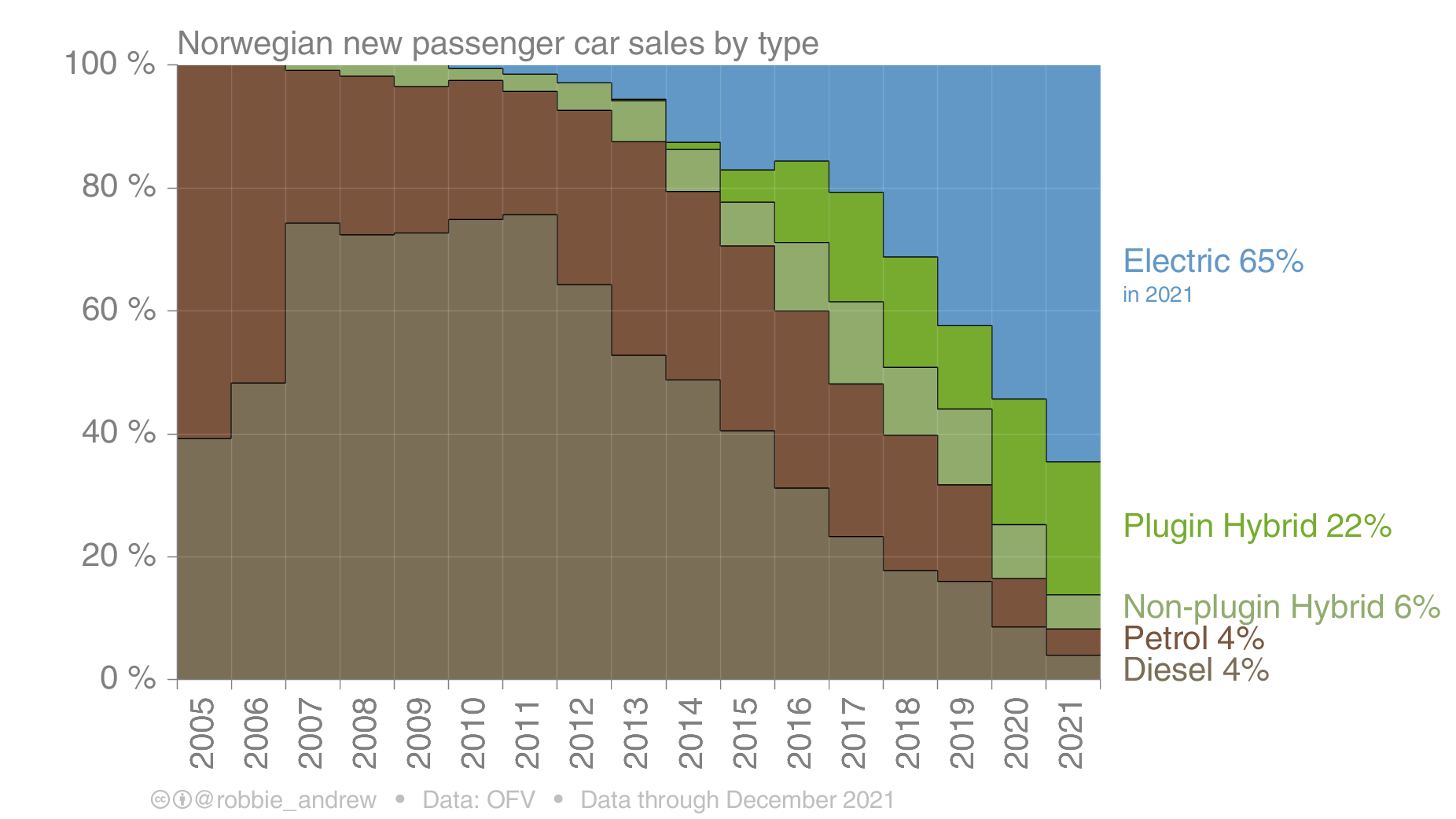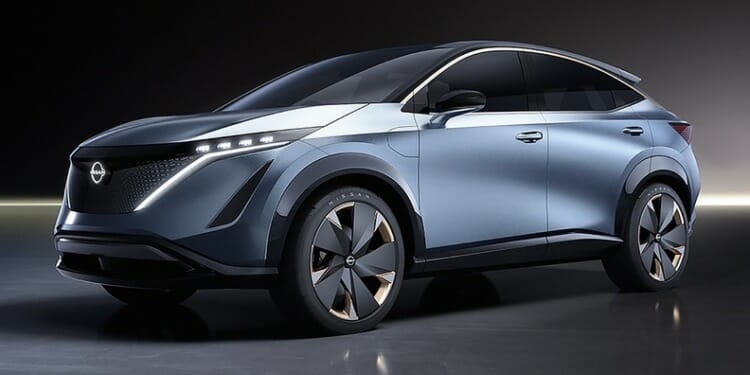Europe’s car market is turning electric, and Norway is leading the pack. Last year, that Scandinavian country known for being Europe’s biggest oil producer, broke a world record: 92% of new cars sold in the country were either electric or hybrids (gas-and-electric). Only a meager 8 percent ran purely on conventional gasoline or diesel.
This drew the attention of New York Times tech journalist Shira Ovide who talked to Christina Bu, the secretary-general of the Norwegian Electric Vehicle Association, who told her: “It has surprised most people how quickly things have changed.” In 2015, electric cars were about 20 percent of new car sales, and now they are “the new normal,” she said.  As the above graph shows, the Norwegian market is turning a cool electric blue. And Norway appears to herald what the future of the European car market could look like very soon (but do keep an eye on Germany electric cars market too) – the combined result of consumers demanding “clean” modes of transportation and of politicians obligingly providing tax breaks.
As the above graph shows, the Norwegian market is turning a cool electric blue. And Norway appears to herald what the future of the European car market could look like very soon (but do keep an eye on Germany electric cars market too) – the combined result of consumers demanding “clean” modes of transportation and of politicians obligingly providing tax breaks.
The Norwegian government did what was easiest to do: those who bought new electric cars didn’t have to pay the country’s very high taxes on new vehicle sales. Additional tax breaks came in the form of exempting EVs from parking fees and road tolls – much to the growing dismay of local municipalities that are used to depending on that kind of income.
But what about places to recharge EVs? The idea is that this too will not be a problem because, as more people own EVs, building more places to charge them becomes an attractive investment. This implies trust in the market forces…But why not? As they say, hope is the last thing to die.
With the ambitious new Green Deal policies in Europe, in particular, the European Commission’s Fit-for-55 revised goals to meet the challenge of climate change, Europe is presenting itself as a mouth-watering market for electric carmakers. And it’s not just Tesla with its great sales but BMW, Mercedes, Volvo and others who are poised to overrun the European market with their new electric models, including the Japanese.
Taking a quick look at some of the main Japanese makers gives an idea of what is afoot. For example, take Toyota, the company that first produced hybrids, breaking a wall against electric cars that lasted through most of the last century. Now, its president Akio Toyoda, the grandson of the founder, is giving a big push to electrification: Toyota plans to produce 30 new zero-emission models by 2030 for a total investment of 35 billion dollars. It will cover three brands – Toyota, bZ (Beyond Zero) and Lexus (it will be 100% electric) – and will be equally divided between developing electric cars, hybrids plug-in or full hybrids and, most important, batteries.
Of course, Toyota being Toyota, it is hedging its bets and will not stop pushing hybrids. “It is difficult to make everyone happy with a one-size-fits-all option,” Toyoda told investors and spectators at an event in Japan. “That is why Toyota wants to prepare as many options as possible for our customers around the world.” In particular, it’s not going gung-ho over battery development, seeing that as the biggest challenge. And the old problem of places to charge remains. “If the charging infrastructure isn’t there, it doesn’t matter how much CO2 would be replaced, customers won’t buy it and instead keep their old car for longer,” Gill Pratt, Toyota’s chief scientist, told the Financial Times.
In short, for Toyota, hybrids will remain its main battle horse. But when it comes to Europe, Toyota management is more enthusiastic. Even before Akio Toyoda had unveiled the car maker’s global plans for electric cars, the Toyota EuropeCEO , Matt Harrison, told reporters at the Kenshiki Forum in Brussels that, in the light of Fit-for-55’s requirements to reduce carbon emissions, they expected their electric car sales to reach 50% of total sales in Europe by 2030, adding that “if the market conditions and infrastructure will permit it, we are ready to sell in Europe only zero-emission cars by 2035, whether electric cars or fueled with hydrogen.”
As to the cost of batteries – still the most expensive and challenging component in electric vehicles – Toyota expects it to go down by 30% in 2025 and 50% in 2030. And it is also working on the development of solid-state batteries – they should arrive in Europe by 2030 – and a new platform that will be called E3; built in the UK and in Turkey and will be used for engines that are fully electric.
Toyota is not the only Japanese carmaker in the run for Europe. Nissan has also big electrification plans – dubbed “Ambition 2030” – and expects that 75% of its sales, starting as soon as 2026, will be a mix of electric cars – 27 new models -, and expects to launch electric cars using solid-state batteries by 2028. Its Sunderland factory in the UK is where most of them will be built, including a new Gigafactory for the production of batteries.
And the Chinese are jumping into the melée with a new electric MG hatchback set to be unveiled this year, reported Autocar, perhaps as soon as April (but as a concept car). Exposed in prototype form in a series of photos uploaded to Chinese social media channels over the weekend (see tweet), the new hatchback is planned to join the recently facelifted ZS EV and 5 EV in a three-strong line-up of electric MG models in the UK. However, for now, the new MG Marvel-R, while confirmed for a European launch later this year, has not yet received approval for UK sales.
Electric-powered MG hatchback prototype exposed in posts to Chinese social media channels. @MGmotor @Robbo032 pic.twitter.com/hosqlspbe0
— Greg Kable (@GregKable) January 10, 2022
These are all great plans provided that the ongoing chip crunch doesn’t put a dent in them. Already 2021 proved to be a difficult year, with Toyota expecting its sales to plunge by over 6% to just under 1.1 million vehicles as a result of the shortage. Moreover, outside of Europe, China and the U.S. electric cars account for only 1% of sales, so for countries with poor power grids, it will take years, if not decades, to catch up.
Editor’s Note: The opinions expressed here by Impakter.com columnists are their own, not those of Impakter.com In the featured image: The Nissan Ariya electric crossover, with a grille-less face, a flat floor and minimalist instrument panel.










